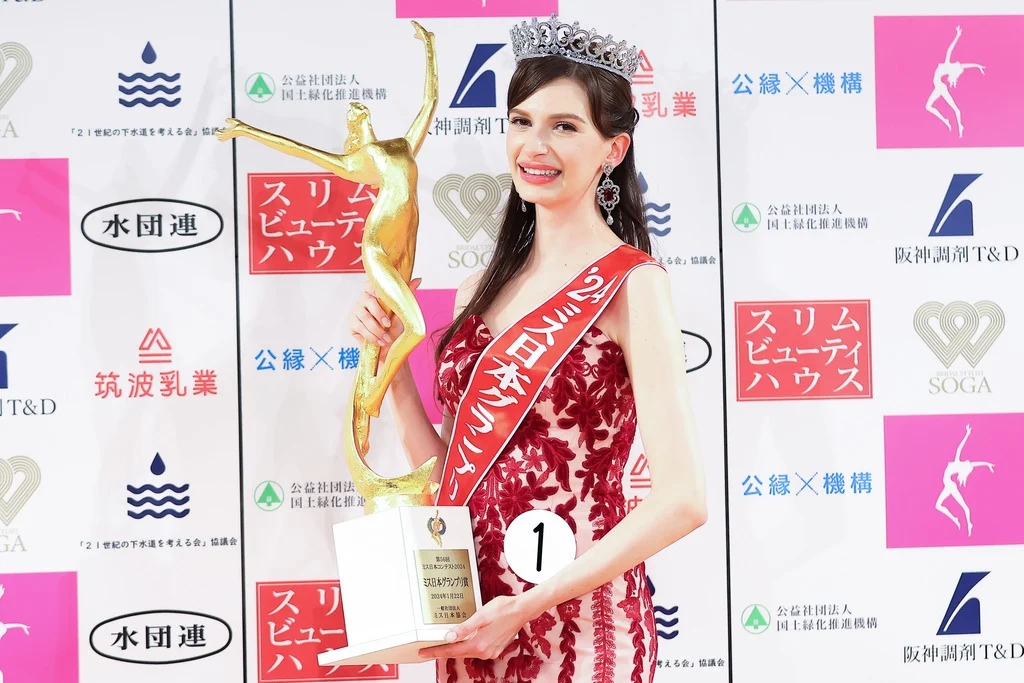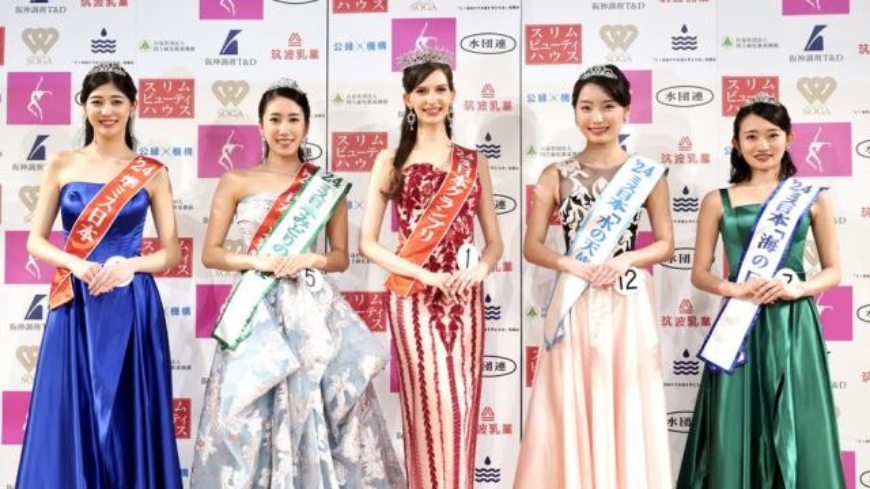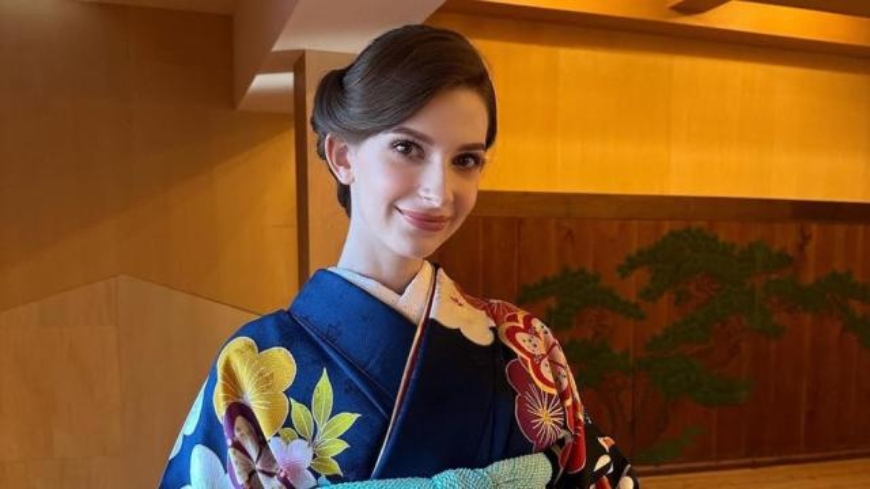Ukrainian-born Model's Miss Japan Victory Sparks Identity Discussion
Ukrainian-born model's Miss Japan victory sparks identity discussion, redefining beauty standards and cultural norms.
Author:Xander OddityReviewer:Dr. Felix ChaosphereJan 31, 20244.7K Shares64.8K Views

Ukrainian-born model's Miss Japan victory sparks identity discussion surrounding identity, cultural representation, and the evolving nature of beauty pageants. In this article, we delve into the details of this significant event, exploring the broader implications for Japan's societal perceptions and the ongoing discourse on diversity and inclusion.
Identity Stir - Ukrainian Model's Win Shakes Miss Japan Norms
“„There have been racial barriers, and it has been challenging to be accepted as Japanese.- Carolina Shiino
When Carolina Shiino was named Miss Japan on Monday, she expressed her emotions in perfect Japanese. The 26-year-old model was reared in Nagoya after moving to Japan when she was five years old. She was born in the Ukraine.
Although she is the first Japanese citizen to win the contest by naturalization, her triumph has reignited the discussion about what it means to be Japanese. Her victory has been hailed as a "sign of the times" by some, while others claim she doesn't look like the typical "Miss Japan".
Her victory occurs almost ten years after Miss Japan 2015 Ariana Miyamoto became the first bi-racial lady to win the title. With an African American father and a Japanese mother, Ms. Miyamoto's triumph at the time sparked debate over whether a person of mixed race should be able to win the tournament.
Ms. Shiino's lack of Japanese ancestry has now offended some people on social media.
"This person who was chosen as Miss Japan is not even a mix with Japanese but 100% pure Ukrainian. Understand she is beautiful, but this is 'Miss Japan'. Where is the Japaneseness?"stated a post on X, which was formerly Twitter.
"If she was half [Japanese], sure no problem. But she's ethnically 0% Japanese and wasn't even born in Japan,"another commenter stated.
Her victory, according to others, was giving the "wrong message" to people across the nation. "I think that Japanese people naturally (would) get the wrong message when a European looking person is called the most beautiful Japanese."
"If she were born Russian, she wouldn't have won. Not a chance. Obviously the criteria is now a political decision. What a sad day for Japan,"someone said.
The Miss Japan Grand Prix pageant's organizer, Ai Wada, informed that the judges had selected Ms. Shiino as the winner with "full confidence".
Ms Wada said:
“„She speaks and writes in beautiful and polite Japanese. She is more Japanese than we are.- Ai Wada
Speaking of her "may not look Japanese" appearance, Ms. Shiino had said on Instagram earlier in the year that, having grown up in Japan, her thinking had "become Japanese."
She also described becoming Miss Japan 2024 as "a dream" as she got her prize.
“„Being recognised as a Japanese in this competition fills me with gratitude.- Carolina Shiino
Because of her appearance, Shiino claimed she has had trouble fitting in and hoped that her victory will alter perceptions of who qualifies as Japanese.
She remarked, “After all, we live in an era of diversity - where diversity is needed. There are many people like me who are worried about the gap between their appearance and (who they are. I kept being told that I’m not Japanese, but I am absolutely Japanese, so I entered Miss Japan genuinely believing in myself. I was really happy to be recognized like this.”
Cultural Diversity In Beauty Pageants
Beauty pageants have traditionally been platforms for celebrating cultural identity, reflecting the prevailing standards of beauty within a particular society. The choice of a Ukrainian-born Miss Japan challenges these norms, highlighting the increasing acknowledgment of cultural diversity and the breaking down of traditional beauty standards in the pageant world.
Identity And The Globalized World
The debate surrounding the Ukrainian-born Miss Japan mirrors broader discussions about identity in an increasingly globalized world. As nations become more interconnected, the lines between national and globalidentities blur. Individuals with diverse backgrounds and experiences contribute to the evolving tapestry of a nation's identity, challenging conventional notions.
Representation Matters
The crowning of a Ukrainian-born model is a testament to the importance of representation. It signals a shift towards recognizing the diverse identities within a nation and challenging monolithic representations. The impact of diverse representation extends beyond beauty pageants, influencing societal perceptions, dismantling stereotypes, and fostering a more inclusive narrative.
Challenges To Traditional Notions Of Beauty
The selection of a Ukrainian-born Miss Japan challenges traditional notions of beauty deeply rooted in local culture. This shift prompts a reevaluation of beauty standards and encourages a more inclusive approach that embraces a spectrum of appearances, backgrounds, and ethnicities.
Social Media And Changing Perspectives
The influence of social media cannot be overlooked in shaping changing perspectives on identity and beauty. Platforms like Instagram and Twitter provide individuals with a powerful tool to express their unique identities and challenge societal norms. The Ukrainian-born Miss Japan, with a substantial following on social media, has become a symbol of a new era where diverse beauty is celebrated.
Nationalism And Identity Debates
The selection has also reignited debates about nationalism and the boundaries of national identity. Some argue that a non-Japanese winner undermines the essence of Miss Japan as a representation of Japanese beauty. Others see it as an opportunity to redefine Japanese identity in a more inclusive and global context.
Navigating Identity In A Multicultural Society
Japan, like many nations, is becoming increasingly multicultural. The selection of a Ukrainian-born Miss Japan reflects the challenges and opportunities presented by a multicultural society. It calls for a reexamination of how Japan defines and embraces its identity in the face of demographic shifts and global influences.
Ukrainian-born Model's Miss Japan Victory Sparks Identity Discussion - FAQs
Who Is The Ukrainian-born Model Who Won Miss Japan?
The Ukrainian-born model who won Miss Japan is Carolina Shiino.
How Has The Selection Of A Ukrainian-born Miss Japan Impacted Traditional Beauty Standards?
The selection challenges traditional beauty standards, prompting a reevaluation to embrace a more inclusive and diverse definition of beauty.
How Has Social Media Played A Role In Shaping Changing Perspectives On Beauty And Identity?
Social media platforms, like Instagram and Twitter, provide a platform for individuals, including Miss Japan, to express diverse identities and challenge societal norms.
What Challenges And Opportunities Does Japan Face In Defining And Embracing Its Identity In A Multicultural Society?
Japan faces challenges and opportunities in navigating multiculturalism, redefining its identity in the face of demographic shifts and global influences.
Conclusion
Ukrainian-born model's Miss Japan victory sparks identity discussion. As societies grapple with the complexities of multiculturalism and globalization, events like these serve as catalysts for important conversations about who gets to define national identity and beauty standards. In navigating these discussions, there is an opportunity for societies to move towards greater inclusivity, embracing the diversity that makes up the fabric of modern nations.
Jump to
Identity Stir - Ukrainian Model's Win Shakes Miss Japan Norms
Cultural Diversity In Beauty Pageants
Identity And The Globalized World
Representation Matters
Challenges To Traditional Notions Of Beauty
Social Media And Changing Perspectives
Nationalism And Identity Debates
Navigating Identity In A Multicultural Society
Ukrainian-born Model's Miss Japan Victory Sparks Identity Discussion - FAQs
Conclusion

Xander Oddity
Author
Xander Oddity, an eccentric and intrepid news reporter, is a master of unearthing the strange and bizarre. With an insatiable curiosity for the unconventional, Xander ventures into the depths of the unknown, fearlessly pursuing stories that defy conventional explanation. Armed with a vast reservoir of knowledge and experience in the realm of conspiracies, Xander is a seasoned investigator of the extraordinary.
Throughout his illustrious career, Xander has built a reputation for delving into the shadows of secrecy and unraveling the enigmatic. With an unyielding determination and an unwavering belief in the power of the bizarre, Xander strives to shed light on the unexplained and challenge the boundaries of conventional wisdom. In his pursuit of the truth, Xander continues to inspire others to question the world around them and embrace the unexpected.

Dr. Felix Chaosphere
Reviewer
Dr. Felix Chaosphere, a renowned and eccentric psychiatrist, is a master of unraveling the complexities of the human mind. With his wild and untamed hair, he embodies the essence of a brilliant but unconventional thinker. As a sexologist, he fearlessly delves into the depths of human desire and intimacy, unearthing hidden truths and challenging societal norms.
Beyond his professional expertise, Dr. Chaosphere is also a celebrated author, renowned for his provocative and thought-provoking literary works. His written words mirror the enigmatic nature of his persona, inviting readers to explore the labyrinthine corridors of the human psyche.
With his indomitable spirit and insatiable curiosity, Dr. Chaosphere continues to push boundaries, challenging society's preconceived notions and inspiring others to embrace their own inner tumult.
Latest Articles
Popular Articles

